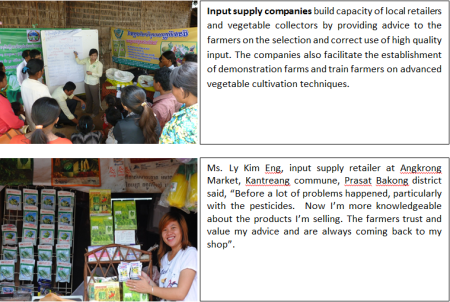20 August 2015
Siem Reap Province, Cambodia–In Siem Reap Province, commercial vegetable farmers are catching on to the benefits of public private partnerships. In less than a decade, public private partnerships have spurred local commercial vegetable production, planting roots for the sub-sector in Siem Reap.
The partnership between the Siem Reap Provincial Department of Agriculture (PDA) and supply companies have become a cornerstone of the GIZ Regional Economic Development (RED) Programme, and have created a new market opportunity, offering local produce to consumers.
Notable Results
So far, the results are notable: Between January 2009 and February 2015, 1,029 training events in vegetable cultivation techniques, including the safe and environmentally friendly use of fertilizers and pesticides with more than 23,000 participants (61% female) have been jointly implemented. Additionally, about 200 demonstration farms have been established in all 11 districts and the municipality of Siem Reap Province.
How it works
As a public private partnership, the main interest of internationally operating input supply companies is to develop markets for their products, whereas the main mandate of the PDA is to promote agricultural production. However, both share common interests: To make quality input available to farmers and to capacitate farmers to apply modern inputs in the right way.
The PDA and its district officers, in addition to its general role of managing and regulating the PPP agreements, define training needs and contents, select the training locations and training participants, and facilitate the implementation of the training events and field days.
As a result, more than 4,600 households have improved and increased their vegetable production considerably. Improved product quality and regularity of supply to markets has led to an increase of seasonal household revenues on average by US$159.
PDA’s close cooperation with the private sector has also improved the technical qualification and services of the agricultural district officers. “I learned a lot from the private companies. The farmers respect me now as an experienced and helpful extension worker,” said Sina Seum (Soutr Nikom) Siem Reap District Officer.
Programme Milestones
2008:
- At the initial stage of the RED Programme, commercial vegetable production was almost non-existent in Siem Reap province. Only seven % of the vegetables found in Siem Reap’s markets were locally produced. Most vegetables were imported from Thailand and Vietnam.
- Farmers focused only on the traditional rainy season rice cultivation and were unable to take advantage of the untapped market opportunities in the vegetable sub-se Moreover, high quality inputs for vegetable cultivation were simply not available.
2009:
- Between 2009 and 2015 several partnership agreements between the Provincial Department of Agriculture and input supply companies such as East-West International, Agrotech Vita, Bayon Heritage were implemented.
2012-2014:
- Since 2012, trainings included the use of organic fertilizers and in 2014, organic pesticides trainings were offered.
2015:
- To date, the contribution of private companies totals to more than US $300,000. How work is divided is based on each partner’s skill set.

Additional program activities improved the cooperation amongst farmers and joint marketing by facilitating the establishment of farmer networks, as well as the cooperation and information exchange between collectors and farmer networks in view of the changing demands for certain vegetable varieties. About 100 input retailers have been trained on the correct use of improved seeds, fertilizer and pesticides in order to ensure their save and proper application.
Today:
- Commercial vegetable production is well established in Siem Reap province: The market share of locally produced vegetables increased from seven % in 2008 to over 25% in 2014. Moreover, improved farmer-collector cooperation, as well as the diversification of the vegetable production (through the introduction of new varieties, extension of the cultivation season from 3 to 6 months, etc) enables farmers to much better align production to the market demand.

